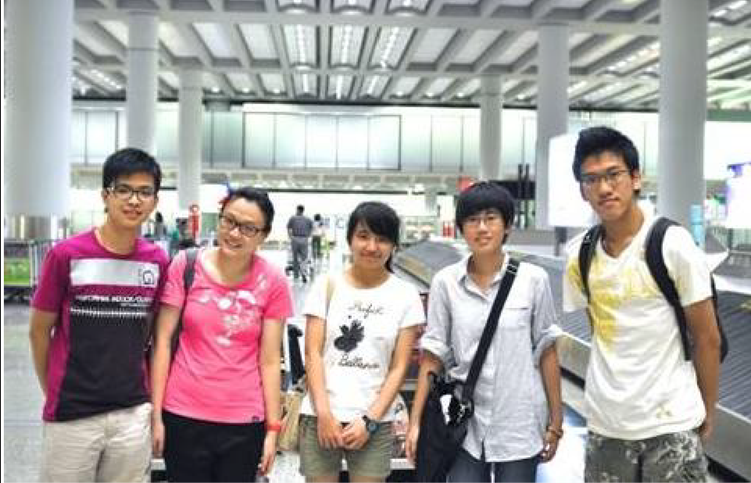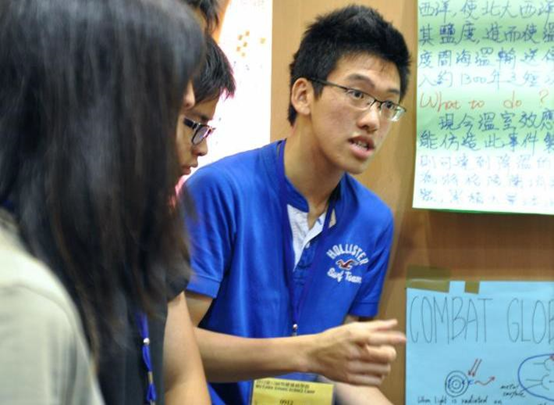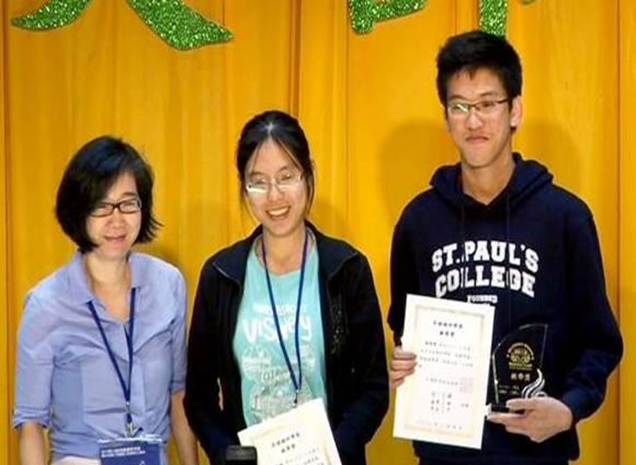Hong Kong Gifted Student Outperformed a Hundred Asian Counterparts to Win Silver Award at Taiwan Science Camp
(13 Sept 2012, Hong Kong) Five student members of the Hong Kong Academy for Gifted Education (HKAGE) participated in the 15th Wu Chien-Shiung Science Camp in Taiwan last month. Besides learning from the international academics including the Nobel Prize winner, the students also exchanged ideas and competed in the creativity contest with around 150 gifted students from Secondary Schools and Universities of Taiwan, China and Malaysia so as to enhance their knowledge of Science. Yeung Wai Lok Charlix, one of the student members, suggested the idea of pace-maker adjustment to prevent arteriosclerosis and cerebral hypoxia in patients. His insight earned the adjudicators’ commendation and won him the Silver Award in the creativity contest.
The student members nominated by the HKAGE to take part in the Camp included Lai Tsz Yan from Our Lady of the Rosary College, Mo Tsz Kin from Hong Kong Taoist Association Tang Hin Memorial Secondary School, Tse Lap Hang from Tai Po Sam Yuk Secondary School, Wong Man Yeung from Fanling Rhenish Church Secondary School and Yeung Wai Lok Charlix, a former student of St. Paul’s College. They were nominated because of their outstanding academic achievements in sciences, science competitions and language ability. Then they passed the selection process held by Wu Chien-Shiung Education Foundation to join the Camp. The participation fee for the Camp and part of airfares were sponsored by the Foundation.
During the lectures in the six-day Science Camp, the student members got rare opportunity to learn from well-known academics and ask them questions. The speakers included Professor Richard Ernst, winner of the 1991 Nobel Prize in Chemistry, Professor Shu Chien, Director of Institute of Engineering in Medicine, University of California, San Diego, Professor Frank H. Shu, winner of 2009 Shaw Prize in Astronomy and Professor Norden Huang, funding director of the Research Centre for Adaptive Data Analysis at the National Central University. They delivered lectures on various topics like “Exploring Tibetan Painting Art by Raman Spectroscopy”, “How Should We Face the Hazards Associated with the Anthropogenic Climate Change” and “Fascinating NMR and its Applications”.
To encourage students to take an active part in the event, the organiser presented various awards (1 Gold, 2 Silver and 2-3 Bronze Awards) to students who performed well in the creative poster contest and asked good questions in the lectures. Awardees had the opportunity to present their work on stage. Charlix outperformed around a hundred participants to win the Silver Award and was presented the trophy, certificate and a scholarship of NTD 8,000 (HK$2,070).
The new idea of Charlix was inspired by Professor Chien’s lecture, from which Charlix learnt about the “blood flow stagnation point” in the artery which is most vulnerable to hardening. This inspired his idea of adjusting the pace-maker of a patient to influence the blood flow and shift the “stagnation point” so as to avoid artery hardening. Besides, he suggested connecting the smart phone to the pace-maker so that whenever the patient is standing up the smart phone in the patient’s pocket could send a signal to the pace-maker to make appropriate adjustment and ensure that enough blood is supplied to the brain to prevent cerebral hypoxia.
Charlix was keen on Science. He was also inspired by Professor Ernst’s words that help to reaffirm his aspiration to become a doctor. “He has given me great insight into the importance of striking a balance between work and passion. He said, ‘To me, Science is one of my legs, and my passion is the other. You cannot walk without any one of them.’ He even used scientific methods like the Raman spectroscopy to analyse and conserve his beloved Tibet painting arts. His attitude towards science helps me identify what I love – helping the needy. I love science because of its potential to improve people’s quality of life and help people who are in need, suffering and underprivileged. Being a doctor could realise my dream of using science to help needy people,” said Charlix.
Charlix said what he learnt at the Camp was far more than scientific knowledge. One other thing he learnt was how to overcome challenges in life. He was so grateful that he could learn from world-class scholars and met students from top universities such as Peking University, Tsinghua University and National Taiwan University.
Dr Stephen Tommis, Executive Director of the HKAGE, said the outstanding performance of the student member was cheerful. He believed that if gifted students participate in more exchange activities and learn more from international academics, their learning motivations can be stimulated. Moreover, as they will have more opportunities to make new friends with similar values, their cognitive and emotional needs will be well catered for.
 | |
| The HKAGE student members (from left to right) Mo Tsz Kin, Lai Tsz Yan, Wong Man Yeung, Tse Lap Hang and Charlix Yeung had an invaluable experience at Wu Chien-Shiung Science Camp in Taiwan. | |
 |  |
| Charlix outperformed more than a hundred participants to win the Silver Award at the Camp. | |






